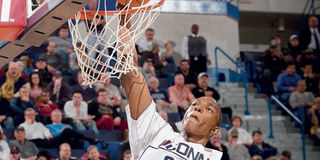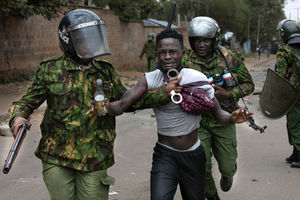Thabeet’s massive size problematic with refs

What you need to know:
- Hasheem Thabeet is a towering figure on the basketball court. His domain is in the lane. He controls the area near the basket with an omnipresent focus, one that’s reminiscent of what Rakim described above.
London. “When I’m at the helm, I cover the whole realm,” legendary rapper Rakim professed in “Remember That.”
Hasheem Thabeet is a towering figure on the basketball court. His domain is in the lane. He controls the area near the basket with an omnipresent focus, one that’s reminiscent of what Rakim described above.
Thabeet swats shots in a hurry and alters the path of many more that float above his remarkably long arms. And dissuades foes from attempting countless shots, too.
Near the hoop is where Thabeet has carved a niche as a premier shot blocker. His global odyssey began as a raw talent in Tanzania, then to Stoneridge Prep School near Los Angeles, to Cypress Community Christian School in Houston, to the University of Connecticut, to the NBA.
At age 30, his basketball career took another turn when he joined the Yokohama B-Corsairs for the 2017-18 campaign.
Clearly not as widely recognized as many fellow NBA lottery picks, the 221-cm Tanzanian big man holds the distinction of being the highest-drafted player to ever compete in a Japanese pro circuit. He went No. 2 to the Memphis Grizzlies in 2009.
Indeed, he’s a famous face in and around the UConn campus, but also, of course, in Tanzania. In a 2010 profile in The Hartford Courant, reporter Mike Anthony noted that “Thabeet is a bona fide celebrity in Tanzania. . . . He has met presidents and done a considerable amount of charity work with children in his home country.”
With the experience of his career in the NBA — he suited up for the Grizzlies (2009-11), Houston Rockets (2011-12), Portland Trail Blazers (2012), Oklahoma City Thunder (2012-14) — as a topic of intrigue among B-Corsairs players, Thabeet has regaled them with stories from time to time.
Or as B-Corsairs forward Jeff Parmer put it: “Yes, he definitely speaks about his NBA experiences. Not that much, but here and there he does speak about how guys would prepare for games and guys he’s competed against. He’s also spoke upon the differences of playing in the NBA opposed to overseas.”
Through Sunday, Thabeet is averaging 12.1 points, 8.9 rebounds and 2.5 blocks (No. 2 in the 18-team top flight. Shot blocking and defensive instincts have been the never-wavering trademarks of Thabeet’s career. All told, he appeared in 224 NBA regular-season games (20 starts) and averaged 2.2 points, 2.7 rebounds, 0.8 blocks and 10.5 minutes a game. He also appeared in four playoff games for the Thunder in 2013, and has had NBA Development League (now called the NBA G League) stints with the Dakota Wizards, Rio Grande Valley Vipers and Grand Rapids Drive. “His defensive skills are helping us out as a team tremendously,” he said. (AFP)
whenever he’s not in foul trouble,” Parmer told Hoop Scoop. “The refs haven’t seen the likes of Hasheem in our league before so he tends to get the bad end of the whistle in most of our games.
“Hopefully, that will change so he’ll be able to stay on the court and be very effective for us on that end of the court.”
Said Alvark Tokyo forward Jawad Williams, a former Cleveland Cavaliers player: “Thabeet’s height and long arms makes him a presence in the paint and he has the ability to change shots.”
B-Corsairs bench boss Satoru Furuta told reporters that Thabeet is an aggressive player who makes important contributions for the team at both ends of the floor. The coach praised the Tanzanian for his energy and hustle.
The B-Corsairs have experienced more setbacks than success to open the season, losing 13 of their first 17 games through Sunday. Injuries to starters Alexis Minatoya and Jason Washburn forced Furuta to juggle the lineup, and newcomer William McDonald filled Washburn’s spot on the roster on Nov. 7.
Yokohama is a work in progress, a team struggling to find its identity.
“I think it’s pretty early for me to have an outlook,” Thabeet told Hoop Scoop, days before McDonald joined the club. “We have two of our starters hurt, and them being out makes us adjust right away how we are going to play for the rest of the season.
“To me, I feel like it’s still early and we’ve still got a chance to get our game together and coming out and competing for 40 minutes and, you know, give it our all because of having two of our starters out.”
Without the injured starters, the B-Corsairs’ cohesiveness suffered a setback, according to Thabeet, who noted “they are all used to each other.”
“It’s different now with them having to adjust to me as a key player now . . . but we are adjusting,” he said. “Overall it’s OK. We could be doing better this season, but it takes a whole group coming together. It’s not about any individual performance. It’ll get better, hopefully.”
Thabeet speaks in thoughtful, measured tones, and views the season as a marathon, not a sprint.
“I think that the time that I’m on the court I make a very big impact,” said Thabeet, who has fouled out four times this season. “I almost cost the team when I’m out, especially with the foul calls and the refs here. Maybe I take so much space, so sometimes they are not sure what to call and things like that. But it does cost me being out of the game so you can see as far as my impact going in there, controlling how many points they score in the paint.
“Even me with turning pro, it wasn’t because of my offense. I was mainly a defensive guy. I direct shots, it goes this way, it goes that way. I’m that guy. Definitely my impact on the defensive end matters a lot, and to me, if we have a great defense and can get stops, that’s how it gets the offense going.”
While Thabeet knows there will opportunities for him to block shots, he also understands that team effort is a key to not leaving opposing players wide open.
“So again, also it’s not a one-man thing,” he told me. “The whole team’s got to be there when I go to help that man, somebody’s supposed to get my man. As much of an impact on defense (I can make), it’s also got to be a team effort.”
Plagued by foul trouble on Nov. 5, Thabeet remained actively involved in cheering his teammates in the second and third quarters before his return in the final period. He predicted the B. League officials “will figure out a better way to referee against me.”
“And also,” he continued, “they also look at my body language and my motive to always be out there — I just want to play ball. I don’t have anything against the refs, I don’t have anything against the other team. I just want to go and compete. I compete at a very high level. I don’t know how to go easy; that’s just me. . . . It’s either you go hard or you lose.”
Success At UConn
During the Jim Calhoun era (1986-2012), the UConn Huskies were a perennial Final Four contender. He recruited elite talent year after year, and shaped his teams for greatness, including a Final Four berth in 2009.
Thabeet fit in perfectly at UConn, where his shot-altering skills made a profound difference.
Calhoun once described Thabeet as “one of the most dominant players in the history of college basketball.”
In 100 games in a Huskies uniform, Thabeet made 99 starts. He averaged 10.3 points, 8.5 rebounds and 4.2 blocks a game. But it was always the blocks that provided the constant reminder that intimidation and erasing scoring chances were huge factors game after game during the Tanzanian giant’s three seasons at the Big East school.
In a nutshell, this was what Thabeet was capable of during his NCAA days: In a January 2009 game, he had 15 points, 11 rebounds and a school record-tying (his record) 10 blocks as then-No. 2 UConn waxed visiting Providence 94-61. After the game, Calhoun proclaimed, “Today, you saw a visual picture of all the things he can do to affect the outcome of a game.”
Thabeet’s stellar junior campaign earned him Big East Conference co-Player of the Year honors, sharing the award with Pittsburgh’s DeJuan Blair, and he was a consensus Second Team All-American, and took home his second consecutive National Association of Basketball Coaches’ Defensive Player of the Year award. He contributed 13.6 points, 10.8 rebounds and 4.2 blocks per game in his final college season.
Thabeet credits Calhoun for instilling in him the confidence that he needed to be a force at the NCAA Division I level.
“The coach made me believe in myself,” admitted Thabeet, who remains in close contact with the 75-year-old Calhoun to this day.
“He’s still my mentor, so definitely he’s up there.”
Thabeet spoke to Calhoun before he joined the B-Corsairs, informing him of the next stop on his global basketball journey.
What was the flame that ignited Thabeet’s road to the NBA? Calhoun’s words.
“He initiated almost a conversation that you’ve got a chance to do a great thing,” Thabeet recalled.
The conversations began as the Huskies were putting the pieces together for the 2006-07 season, building their roster in the preseason.
“Knowing UConn, they recruit the best in the country and he (Calhoun) tells me, ‘These are the best players. You are going to have to compete for a starting spot,’ ” Thabeet recalled.
During these grueling workouts, Calhoun convinced Thabeet he has a chance to be a starter. That was just what he needed to hear.
Thabeet embraced the challenge and earned a starting job as a freshman. He remembered Calhoun telling him, ‘With your work ethic, you’ve got a chance to do great things.’ “
“And before you know it, we play at the Garden (Madison Square Garden, home of the New York Knicks) and my name’s out there, and there’s all kind of momentum building up throughout my freshman year.”
Life in Tanzania
Thabeet, who has one older sister and a younger brother, hails from Dar es Salaam, Tanzania’s largest city. He considers his upbringing as being pretty normal, a “very comfortable childhood . . .”
“Definitely, we grew up in a society where, I don’t know if there’s a word to describe it, but everything was almost like we didn’t buy so much or maybe have so much,” he told me. “It was more we have a very happy family, we have friends to play with. I grew up in a very small community where our house and our school was right there. You look up on the other side of the wall, and that’s our school right there.”
Thabeet’s height, however, is extraordinary. Both his parents were about 173 or 176 cm.
His love for his country is indeed special, perhaps even made stronger by the extended absences, going to high school and college in the U.S, and later playing in the NBA and the D-League.
“When I went to U.S. from high school my whole life changed . . . but when I get a chance to go to Tanzania, it’s everything,” said Thabeet. “Going home, still going back to the city where I grew up, the schools where I went to, I go and visit them, so I’m not home, but I’m always home (in my mind).”
His mother Rukia’s is No. 1 on his list of favorite things from Tanzania, where Swahili is the primary language.
“She makes a lot of different dishes,” he said, smiling, “just her way of cooking, you can tell it’s her.
“When I’m home, I eat home all the time.”
The Tanzanian cuisine is enriched by a wealth of spices from Zanzibar, aka Spice Island. (“The food in Tanzania is just warm. . . . There’s just a lot of spices and oil makes it better,” he said. “A lot of flavors.”
Basketball memories
What did being drafted No. 2 overall do for Thabeet’s confidence? Did it raise immediately?
“To me it was like, ‘Is it really happening? Is it really happening?’ . . . It wasn’t something where I grew up (thinking), ‘One day I’m going to play in the NBA,’ ” he admitted.
“Michael Jordan, Hakeem Olajuwon, Kareem Abdul-Jabbar weren’t my role models. My role model was my dad. So you grow up and then you hear these names and one day, wait, I’m about to be a part of it. So confidence, it was all momentum to me. I keep realizing I was getting better and better. I started playing basketball when I was 16.”
Thabeet played soccer as a youngster, getting numerous tips from his father, a soccer player and architect.
“I wanted to be like him in so many things, my role model,” Thabeet said.
His father passed away when Thabeet was 14. In the years after, Thabeet has always wanted to make his father proud of him.
He remembers all the “5 a.m. practices, (where) we have all these college coaches coming over to watch us” while he began to develop as a schoolboy prospect.
“. . .They started recruiting me, you start getting these letters and you get to the point where you have all these elite basketball schools recruiting you. They want you to go visit, and then the coaches keep calling up.
“I just started playing basketball at that age, and I get to the U.S. and there’s these people doing all these dunks like I’ve never thought about. I’m like, ‘Damn, these kids are pretty good . . .’ “
He attended Stoneridge Prep, near Los Angeles, before eventually moving on to Houston, and the sophisticated passing of his teammates and foes impressed him.
Reminiscing about one of the prep tournaments from his days at Stoneridge, Thabeet remembered thinking, “Man, they are way ahead of me.”
Talking to his high school coach, Thabeet asked, “Am I really going to do this?”
“You have a chance to do something special,” Thabeet recalled his coach saying.
“So when you keep hearing stuff like that it can only boost up your confidence, and it makes you even work harder.”
For four years, Thabeet didn’t visit Tanzania, didn’t see his family. When he enrolled at UConn, his mother visited Connecticut and got to see that Thabeet “was already used to the routine of working out really hard.”
Throughout his career, he has never shied away from the challenge of facing the top pivotmen.
“It doesn’t matter who’s the best center that will be going against me,” Thabeet declared. “I’m going to go against him. . . . I’m going to compete, because if you relax, then you are going to get exposed. If somebody outworked you, then you can’t say, ‘Oh, I’m still better than that man now.’ You got outworked. So to me hard work is always the thing.”
His large size has always been a constant, too.
“Even when I was young, I was always tall for my age,” he said, “so I would never play with kids my age, I would play with the older group.”
Did No. 34, worn by NBA legends Hakeem Olajuwon and Shaquille O’Neal, among others, inspire Thabeet to wear it?
Said Thabeet: “Once I got into basketball, I saw a lot of big men wearing 34 number so it fits me. I get to UConn and Ray Allen is the only guy that wore 34 there, and I asked for the number, and they gave it to me, and they told me, ‘Hey, these are big shoes to fill, because this guy who wore 34 here did some things for UConn, so you’ve got to do something.’ And I was blessed enough to do great things at UConn.”
As for the chance to be the first Tanzanian in the NBA, he views it as “a blessing.”
“Right now a lot of people are buying videos in the U.S., growing up (and) training to be NBA players,” Thabeet said. “You go somewhere now in the U.S., there’s kids 10 years old training to become NBA players. . . . But to me (this path) didn’t happen, so to get a chance to do that it was just a blessing.”
From his high school days, he said he was relatively unknown. His recognition grew and grew while at UConn. And now with social media as a catalyst, Thabeet is a household name across Tanzania.
“All of a sudden, it was big news back home,” Thabeet said of his being drafted by the Grizzlies.
“But it never really got into my head that way. To me, it was more I’ve been doing this since I got to the U.S. high school days and I’m just going to keep doing it.”
As our wide-ranging conversation came to close, Thabeet fondly recalled his rookie year, going up against Shaq and Dwight Howard, two of the star centers of that era.
“I remember those days like it was yesterday,” he said. “As a young guy coming to the league, with all this hype, No. 2 pick, and that’s something you say. I want to get drafted. It just happened, and you get drafted with a team you didn’t even work out for, you have no ideas what’s going on.
“If I were able to go against those guys, I can go against anybody. It’s just a matter of working harder than them.”
Halfway around the world, Thabeet, the pride of Tanzania, still embraces that mentality as a vital member of the B-Corsairs.
In February, Thabeet suited up for Philippines club Mighty Sports in the Dubai Invitational Basketball Tournament. At that time, he told spin.ph, a Philippines website, “I’m big, strong, fast, now it’s all about IQ. What can you bring to the team? I can always protect the rim, I can always play defense. What do I bring to the team more than that? How can I be better more than I was yesterday? So everyday, I’m progressing,” he said. He has also said he aspires to return to the NBA someday.
The final chapter of Hasheeem Thabeet’s basketball career is far from written. There’s many more games to play. Many more shots to block.




